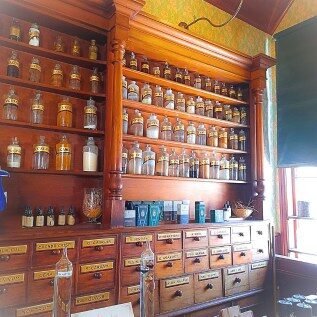
Apothecary Wisdom: Grow & Use Your Own Remedies
In a world where health and wellness have become increasingly commercialized, it’s easy to forget the ancient wisdom of natural healing remedies. So in this blog, we talk about the fascinating world of apothecaries, where herbal remedies and traditional medicine meet. We’ll explore:
- What apothecaries are, their history, and their significance in the past
- The apothecary vs. modern medicine
- The importance of reclaiming our sovereignty over our health and wellness
- The benefits of growing and using traditional herbs like chamomile and thyme
- A sneak peek into our upcoming Wholistic Apothecary project, where you’ll learn how to harness the power of safe natural remedies yourself.
So let’s get started into the lost wisdom of ancient apothecaries and rediscover the power of natural healing.
Apothecary Meaning: Understanding the Origins and Significance
For those who may be unfamiliar, an apothecary is essentially a storehouse or pharmacy where medicinal herbs, spices, and other natural remedies are prepared and sold. In the past, apothecaries were not only places where people could buy medicines, but also where they could learn about natural remedies and how to use them to heal themselves.
On a recent trip, some of our team visited a 180-year-old apothecary. It was enlightening. Seeing bottles of old remedies, some of which our team knew immediately, was an indulgence of the senses. The colours of the items in some of the bottles were amazing. Knowing what the scents would have been when the produce was fresh was exciting. The enormity of the range was thrilling. Apothecary shops like this one were once the backbone of community healthcare. Our spirits were lifted as we reflected on the surge of popularity once again for these old remedies.
Disclaimer: Although exciting, it is important to note that some of the old remedies are now proven to be unsafe, so we do not recommend
The Apothecary vs. Modern Medicine: What Changed?
In the 1850s, when these apothecaries were in daily need, it was merely a shop that sold the goods. The ‘doctor’ was only there to sever a body part that could not be saved, his tools were an apron, a saw, and a very rudimentary bandage stock.
In fact, the apothecary was the supplier of goods, and the customers were their own doctors. They had healing regimens handed down through the generations; the melting pot of nationalities served the community as many had remedies that were new to some.
So how did we go from sovereignty of health to health governed by a handful of companies (collectively known as Big Pharma)? When did farma-use of what grew in our gardens and farms-get superseded by chemicals, pre-pressed pills, and shelf-stable products that have a long list of ingredients?
With the emergence of pharmaceuticals, came the driving of profits, which seemed to all but outweigh the outcome. With soaring profits and chemicals also came soaring side-effects and the need for a cure for the cure.
We entrusted our health to a doctor, now a far cry from the chap with a back room to operate in, a saw, and an apron. In turn, we lost trust and faith in ourselves. We shunned the age-old remedies that had little to no side effects.
Behind the Name: Uncovering the History and Meaning of the Word “Doctor”
Did you know the word “doctor” actually originates from the Latin word “doctor,” meaning “teacher,” which in turn comes from the verb “docere,” meaning “to teach“.
In the Middle Ages, “doctor” initially referred to eminent scholars, particularly theologians who were qualified to teach religious doctrine.By the 14th century, the title expanded to encompass those who received a Doctor of Philosophy (Ph.D.) degree and other advanced degrees. Medical schools, particularly in Scotland, began to address physicians as “doctors” in the 17th century, recognizing the respect and prestige associated with medical training.
Today, “doctor” is used for medical practitioners (MDs), those with advanced academic degrees (PhDs, JDs, etc.), and in some cases, honorary doctorates.
But we were once our own teachers of health. We have left the time of sharing remedies, helping our neighbours, and growing our medicine. There now is no health teacher’, just a range of people who have studied and now preach rather than teach. Modern medicine or allopathic medicine does indeed have a place in our lives. But why have we so willingly left behind the tried and true power of herbs, flowers, oils, and the like? As we left the apothecary, excitement gave way to sadness. So many people have access to natural remedies yet remain unaware of their potential.
Take the Challenge: Grow a Herb That Supports Your Health
We challenge you to reconnect with nature by growing just one herb or flower that supports your health. Here are two easy-to-grow, multi-purpose options:
Option 1: Chamomile
Chamomile is a versatile and beneficial herb to have in your garden, offering numerous advantages for gardeners, individuals seeking relaxation, and pet owners alike.
Key Benefits:
- Easy to Grow: Chamomile can be easily sown by seed or planted as a seedling, making it a great choice for gardeners of all skill levels.
- Pollinator Attractor: It attracts bees, which are essential for pollinating fruit trees, thereby enhancing fruit production.
- Living Mulch: Chamomile serves as an excellent living mulch for trees. Simply cut it back and leave it on the ground to return nutrients to the soil.
- Relaxation and Wellness: The flowers can be used in teas, bath soaks, or dried and placed under pillows to promote relaxation. This benefit extends to pets as well, by drying the flowers and scattering them in their bedding.
- Natural Pest Deterrent: The fragrant leaves of chamomile help keep unwanted bugs away from doorways.
Option 2: Thyme
Thyme is another highly beneficial herb that not only enhances culinary dishes but also offers health benefits and natural pest control.
Key Benefits:
- Culinary Delight: Fresh or dried thyme is a fantastic addition to various culinary dishes, elevating their flavor profiles.
- Respiratory Health: Thyme aids in respiratory health when brewed as a tea, providing a natural remedy for respiratory issues.
- Pet-Friendly: Like chamomile, thyme is safe for pets. Drying and adding it to their bedding can help repel mites and fleas.
- Natural Pest Control: Thyme naturally deters flies and other pests, making it a valuable addition to any garden or home.
Introducing Our Wholistic Apothecary: Your Ultimate Resource for Natural Healing – Coming Soon!
Our team are working on our own Wholistic apothecary for you—a resource dedicated to helping you grow, use, and appreciate natural remedies. Watch this space for more information. In the Wholistic Apothecary, you will learn how to grow, use and appreciate traditional farma.







